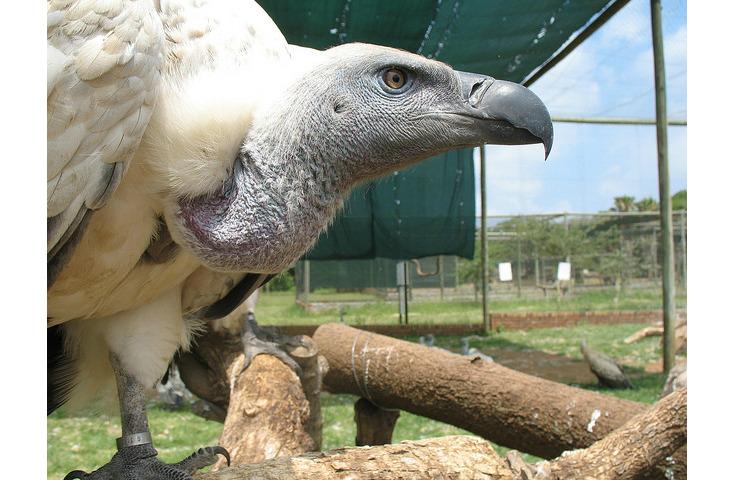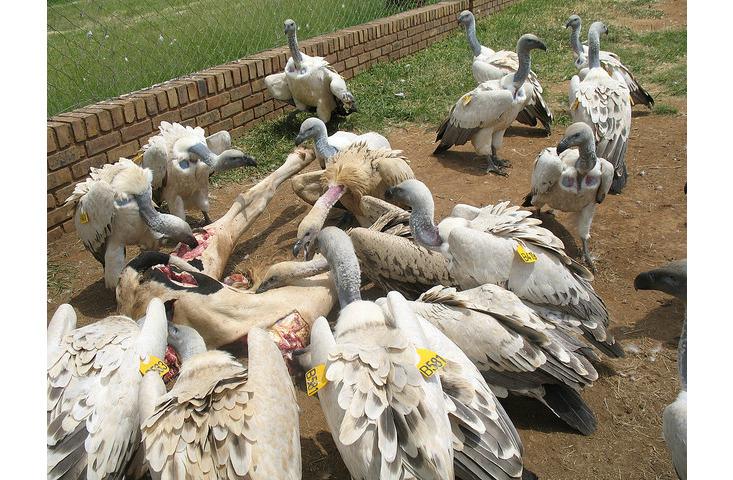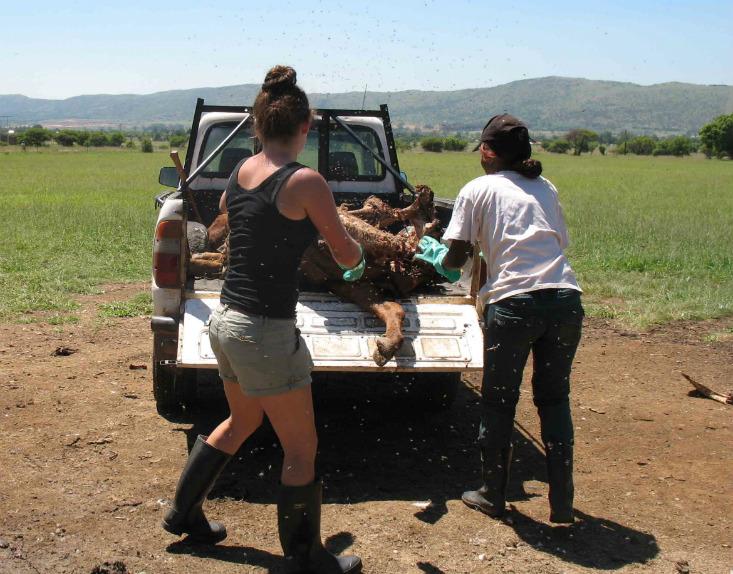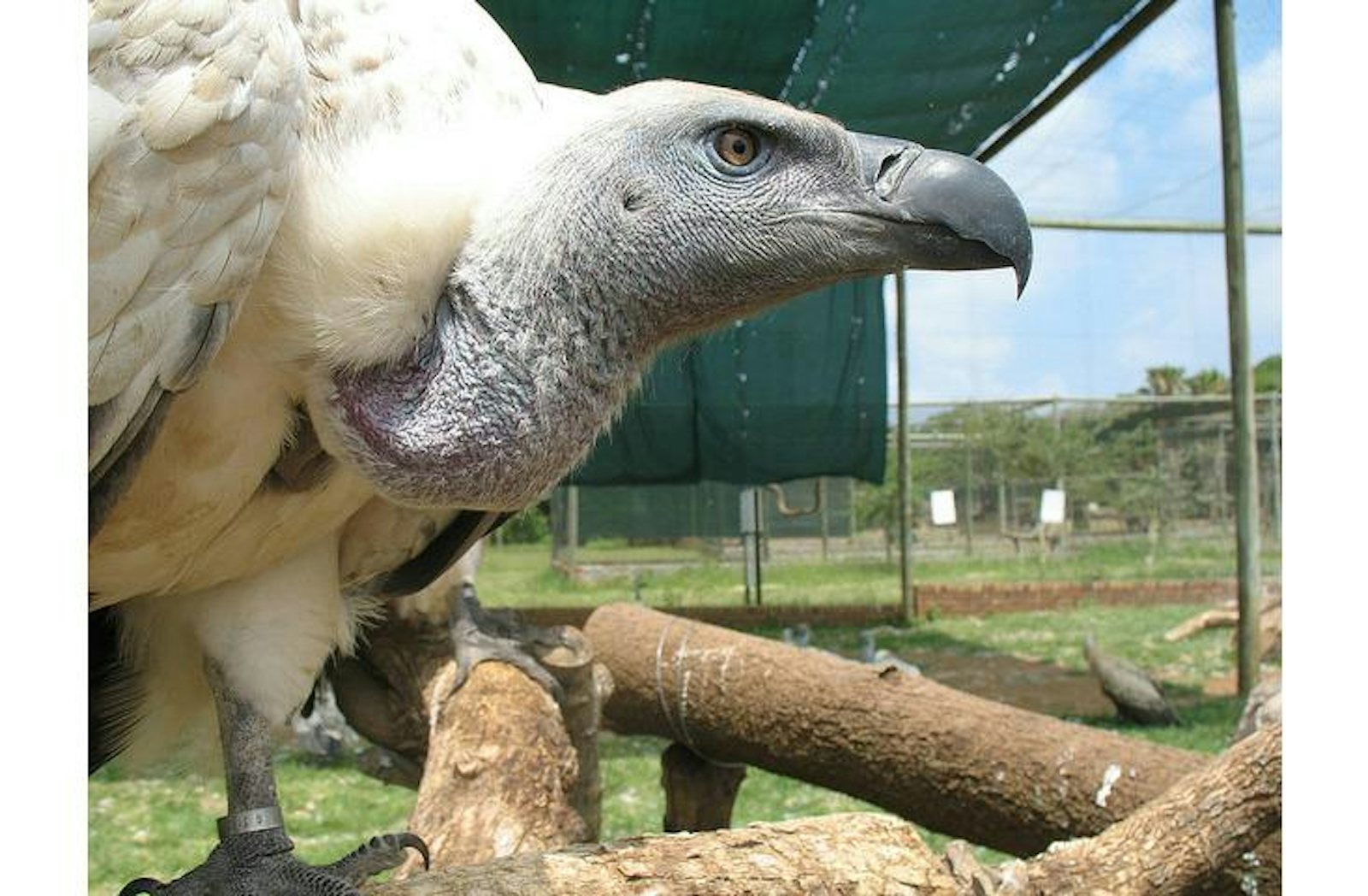
The sun is hot and high over Hartbeetspoort, South Africa, the air thick with humidity and flies. On the dirt in front of us are the remains of three cows. Bridgette Cahill asks, “Ready to get your hands dirty?”
Her fellow volunteer Nobuhle Thelma Mabhikwa nods.
They work together at VulPro, a non-profit vulture-rehabilitation center. VulPro cares for sick and injured birds, and offers safe food for wild and released birds at their “vulture restaurant.” The restaurant serves carcasses of large animals that have been donated by nearby farms. Every few days, the volunteers clean up what the birds have not eaten and bring new carcasses to the restaurant.
On this particular day, the wild birds aren’t very hungry, and they leave a lot of heavy, pungent meat on the bones. The volunteers’ job is to break the cows down into small enough pieces to cart across the field to a pit where the remains will be burned. They tug and twist at the bones, but even mostly stripped cow carcasses can weigh hundreds of pounds. They use knives to saw through the tough hides.
Another volunteer comes by with her small pickup truck outfitted with a winch. They try a few different points to attach the winch hook to the first carcass before settling on the eye socket. Cahill operates the switch, slowly lifting the cow off the ground, head first, amid a blur of blue, black, and bright green flies. It leaves a dark oily stain and a trail of maggots on the ground. The smell is an otherworldly mix of rotten meat, decomposing grass, and fermentation.
VulPro’s director, Kerri Wolter, rehabilitates sick and injured birds and investigates ways to mitigate threats to vultures around the world, including poisonings. She started VulPro to help the Cape vulture, a bird that scours the grasslands of southern Africa for dead and decaying animals. By eating the rotten meat, the vultures remove many dangerous pathogens from the environment, which reduces disease risks to livestock and wildlife. There are fewer than 3,000 breeding pairs left in the country, making them a conservation priority and a “vulnerable” species on the IUCN red list. She also takes in injured white-backed, lappet-faced, and white-headed vultures, all vulnerable or endangered species.
African vultures are vulnerable to a number of threats. Power-line collisions and electrocutions take down dozens of birds each year in already stressed populations. The use of vulture parts in traditional natural remedies put more birds at risk, and in parts of southern and western Africa, consuming a vulture’s brain (by eating or smoking it) is believed to confer clairvoyance, so traditional medicine, or muti, practitioners pay a bounty for vulture heads. Inadvertent and deliberate poisoning may be the biggest problem, and has cost the lives of entire breeding colonies of vultures in South Africa. Pharmaceuticals that are used to treat livestock remain in the animals’ bodies when they die, and can be toxic to vultures that eat the carcasses. Poisoned meat, which ranchers put out to target predators such as hyenas, are also dangerous to the birds.
“It’s no longer just, ‘Is there food out there?’ it’s ‘Is this food safe from veterinary drugs, is it safe from [flea and tick] dips, and is it safe from poison?’” says Wolter.
Each morning, before they attend to the restaurant, which is for the benefit of wild birds living in the wild, Cahill and Mabhikwa first address the Cape vultures in the triage, rehabilitation, and breeding enclosures, feeding piglet carcasses to their “patients.”
“Good morning, darlings!” sings Cahill.
“Come here my babies, come eat your food!” calls Mabhikwa.
Cahill says scavengers aren’t usually thought of as darling, but that’s because people don’t understand the birds. “It’s our job to tell people how sweet they are!” she says, scratching the soft down under a resident Cape vulture’s tawny and white ruff. Despite what looks like a perpetual glower, P.J. is a curious and playful bird. He likes to tug the brooms and buckets that the women often have with them.

Cape vultures have strong beaks, but they aren’t sharp enough to tear through livestock skin. In the wild, a predator such as a lion or leopard would “open” the carcass and vultures would come share the feast and eat whatever the big carnivore left behind. At VulPro the volunteers’ kitchen knives act as lion tooth and claw. One slice down the pig’s belly and the intestines begin to spill, then a couple more quick punctures to the shoulders and haunches—and dinner is served.
After the captive birds are fed and watered, we head to the restaurant. Its décor includes a bright-yellow kiddie pool full of fresh water for the birds and an acacia tree bent over a natural pond rimmed with a tall dirt dam. On a good day, more than 120 birds can be seen squabbling over dead cows, horses, and sheep donated by local farms.
Vultures eat carrion, which you might think would keep them from being too discerning. But sometimes, just like people, they are picky eaters. In the wild, hyenas and jackals would chew the bones clean, but inside the center grounds, there is no such cleaning staff. Plus, some days, the birds just don’t seem too hungry.

“You get used to it—eventually,” says Mabhikwa as she gathers up rotted remains left in the wake of the first winched carcass. The flies have become a thick cloud, and even on the new carcass, the scent of decay is beginning to overpower the sweet smell of live, grass-fed cow. But African vultures will not find this meal based on its odor. They don’t have the same sharp sense of smell that North America’s turkey vultures have; instead, they’ll find their meal at VulPro with highly developed vision. Overhead the early birds have already seen the new cow and are circling. On the edge of the dam, a released bird is perched, waiting. The young women look up and redouble their efforts to clear the grounds and get out of the way.
The remaining, leftover cows are loaded, piece by sticky piece, with a combination of winch and brute strength, and the new carcass is laid in their place. Then the truck bumps over the grass and away from the restaurant to the pit. Once there the women climb into the truck bed and push at the gummy bones and skins with their rubber boots and tug with gloved hands. The pile of rotten cow slowly slips off the truck’s tail end and over the lip of the dug-out pit. It’s disgusting work, to be sure, but for both women, seeing sick birds get stronger, get released, and then come back for a safe dinner at the restaurant makes it all worth it. We watch from across the field as the circling birds begin to land near the new carcass.
To get through the goriest days, Cahill has a mantra. “It’s easy: You just say ‘I love the birds. I love the birds.’ I mean, why else would you do it? I certainly wouldn’t do any of this for people.”
Chelsea Biondolillo‘s work has appeared or is forthcoming in Discover, Science, Birding and on state and National Public Radio. She is currently the Olive B. O’Connor fellow in nonfiction at Colgate University.


























